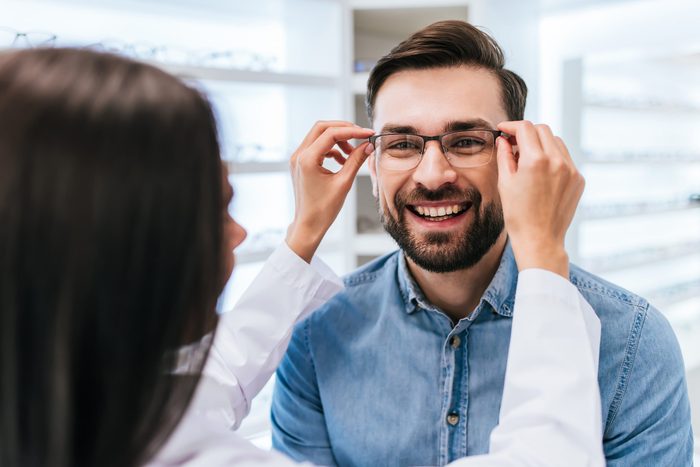
Signs you need new glasses
Your vision can change over a period of time. Your TV, computer, or signs may appear fuzzy or non-descript, even when you’re wearing glasses. So, how do you know when it’s time for a new pair?
Your eyes work as a lens, adjusting their focus for objects at different distances away, whether it’s the computer a few feet from your face or the road far off in the distance, says Reena Garg, MD, who specializes in the medical, laser, and surgical treatment of glaucoma and cataract at the Washington Eye Institute in Riverdale, Maryland and is the associate program director for the ophthalmology residency program at Washington Hospital Center-Georgetown University.
Read on to learn the seven signs that suggest you need new glasses that have nothing to do with blurry vision.

Your eyes are aching
“If you’re compensating not just for distance but because the glasses lens is wrong, that muscle works a little harder,” says Dr. Garg. With your eyes working overtime, your eyes might feel achy, tired, watery, or dry.
Here are the reasons you have watery eyes.

You’re getting headaches
All that eyestrain can be a headache—literally. While your eyes are working harder than they should, you might start feeling a dull ache right around your eyes, especially after reading a book, staring at a computer, or looking at a blackboard. “When you’re focused on these objects, that muscle is working extra hard, and when your prescription is wrong, it’s working even harder,” says Dr. Garg. Every now and then, take 15 to 30 seconds to focus on something else in the distance to give your eyes a break, she says.
Make sure you’re aware of these surprising headache triggers.

You keep squinting
Shutting your eyelids a bit lets in less light, which helps you get a clearer picture when your vision isn’t right. Squinting could help compensate for a slightly off prescription, but if you let it go too long as your sight gets worse, you could end up with headaches. “Initially it’s probably more of a subconscious thing, but as the prescription is less right and more wrong and [people are] squinting more, it’s taxing on the eye,” says Dr. Garg.
Add these eyesight-improving foods to your grocery list.

You never go anywhere without sunglasses
“Bright, harsh lights can be really taxing to the eye, especially if you don’t have the right prescription,” says Dr. Garg. You might find that you need to pull your shades out more than usual or turn down the brightness of your TV to keep your eyes from getting overworked.
Learn about the 10 sunglasses myths that could ruin your eyes.

You’ve been adjusting your computer
Messing with your computer so you can see the screen better? The problem might be your eyes, not your setup. “A lot of times patients say they have to sit farther back from the computer screen to see better or put a few books under the computer and things like that,” says Dr. Garg. Take those little adjustments as a sign to head to the eye doctor.
Concerned you might be addicted to social media? Here’s advice on how to unplug.

You’re feeling nauseous
Both your eyes create two images, which your brain weaves together to create the seamless picture. But if one eye has fuzzier vision than the other, the wonky image could make you feel sick. “If one eye has a stronger prescription than the other eye, all of a sudden your brain is seeing two separate images,” says Dr. Garg. “It’s hard for the brain to resolve to put those images together.” In response, you could start feeling vertigo, nausea, or double vision, she says.
Find out the answers to the age-old question: what causes vertigo?

It’s been more than a year since your last eye exam
“Once a year is about the amount of time to take your prescription to change if it’s going to,” says Dr. Garg. Eventually your prescription will become more stable and you can wait two or three years between check-ups, but she recommends most people get an eye exam once a year, unless your doctor asks you to come in sooner.
Next, change the way you live by reading up on these new health studies.